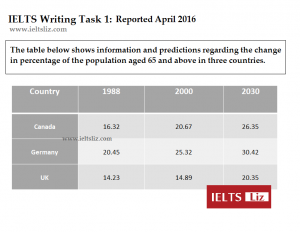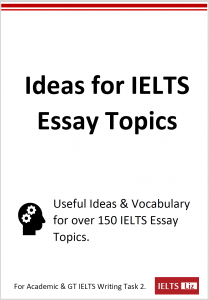This is a model answer for an IELTS writing task 1 table of future predictions as well as past information. This type of writing task 1 requires you to use both past tense and future forms in order to present the information accurately. Download the free pdf copy of the table and answer: IELTS Table Future Prediction Model Answer. A similar future table was reported in the IELTS test in 2021.
Model Answer with Future Predictions
IELTS Table Model Answer
The table gives information about the proportion of the population who are 65 years old and over in 3 countries (Canada, Germany and the UK) in 1988, 2000 and an estimated percentage for 2030.
Overall, the population of elderly people is predicted to rise in all three countries from 1988 to 2030. The highest percentage of older people was in Germany, which will continue to remain the highest in 2030, while the lowest proportion can be seen in the UK over the period given.
Between 1988 and 2000, the aging population of Canada and Germany went up by around 5% to 20.67% and 25.32% respectively. The UK, on the other hand, showed relatively little change in the proportion of its population aged 65 plus and remained at just under 15% in both years.
By 2030, it is expected that the population of people aged 65 and above will increase by approximately 5.5% in all three countries. The percentage is forecast to reach 30.42% in Germany, 26.35% in Canada and 20.35% in the UK.
Recommended for IELTS Writing Task 1
- Paragraphs & Structure
- Conclusion or Overview: Tips & Advice
- How to Describe an IELTS Bar Chart
- Band Score Tips & Summary for WT1
- Pie Chart Model Answer
- All Model Answers, Tips & Advice for IELTS Writing Task 1
Main IELTS Pages
Develop your IELTS skills with tips, lessons, free videos and more.






